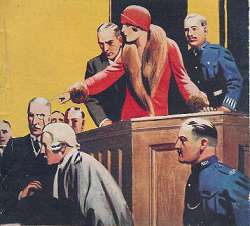In what has been billed by the police as a major terrorism trial, seven Britons appeared at the Old Bailey courthouse on Tuesday, accused of training in Pakistan to carry out bomb attacks in Britain more than one year before the London attacks in 2005.
One of the men, Omar Khyam, 24, was said by the prosecution to have told an associate that Britain should be attacked because "of its support for the U.S."
"They were intercepted before the plot could reach fruition," the prosecutor, David Waters, said as the seven men, 18 to 33, in jackets and suits, listened. But, Mr. Waters said, "the interception came only when most of the necessary components were in place, and all that remained before their plans achieved the ultimate goal was for the target or targets to be finally agreed."
The trial could last months, and the prosecution indicated Tuesday that a principal witness would be Mohammed Junaid Babar, a Pakistani-American computer programmer from Queens, N.Y.. Mr. Babar is to be called to testify from the United States, where he pleaded guilty to charges of supplying military equipment to a Qaeda training camp in Pakistan and working to aid the failed bomb plot in London.
The events leading to the trial became public when six of the suspects were arrested during police raids in March 2004, during which, the police said, more than half a ton of ammonium nitrate fertilizer was seized at a storage depot in West London.
The men have denied conspiring with a Canadian, Mohammed Momin Khawaja, to cause an explosion "likely to endanger life," along with other charges related to possessing bomb-making substances.
Mr. Waters, the prosecution lawyer, said the accused had spent time in Pakistan, where some had family connections.
"Their principal purpose, however, in spending time in Pakistan was to acquire expertise in relation, particularly, to explosives, an expertise which was to be deployed in the plan to cause explosions," he said.
The likely targets in Britain were pubs, nightclubs or trains, Mr. Waters said, quoting from a conversation between Mr. Babar, the witness, and Mr. Khyam, one of the defendants. "Khyam told Babar he wanted to do operations in the U.K.," he said. "He then referred to potential targets: pubs, nightclubs or trains."
"Khyam's motivation, as explained to Babar, was clear," Mr. Waters said. "The U.K. was unscathed; it needed to be hit because of its support for the U.S." Mr. Babar also learned during contacts with the accused in Britain before their arrest that they worked for a man called Abdul Hadi, whom Mr. Khyam had described as "No. 3 in Al Qaeda," according to the prosecution.
Mr. Waters chronicled several journeys by the accused men between Britain and Pakistan, and said some of them tested a small explosive using ammonium nitrate and aluminum powder at a camp in a place called Kalam.
"Some care was taken in order to disguise the fact that they were attending a terrorist training camp," he said. "For example, they took on the appearance of tourists visiting lakes and glaciers in the area in which the training camp was held."
Evidence was taken from surveillance that drew, in part, on listening devices in the homes of two defendants and in a car, Mr. Waters said.
The six men in addition to Mr. Khyam were identified as Waheed Mahmood, 33; Shujah-Ud-Din Mahmood, 18; Anthony Garcia, 27; Nabeel Hussain, 20; Jawad Akbar, 22; and Salahuddin Amin, 30. |
 Pervez
Pervez 
 A dual nationality American student, who was the first person extradited to the United States by Britain on terrorism charges, was refused bail on Friday by a federal judge and ordered to remain in custody.
A dual nationality American student, who was the first person extradited to the United States by Britain on terrorism charges, was refused bail on Friday by a federal judge and ordered to remain in custody. NEW YORK (AP) - An American student arrested last year in London on allegations of providing al-Qaida fighters with equipment to attack American soldiers was in federal custody Saturday.
NEW YORK (AP) - An American student arrested last year in London on allegations of providing al-Qaida fighters with equipment to attack American soldiers was in federal custody Saturday.